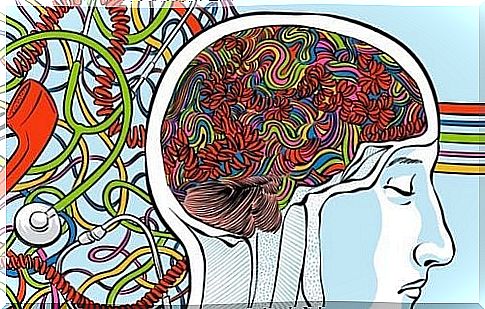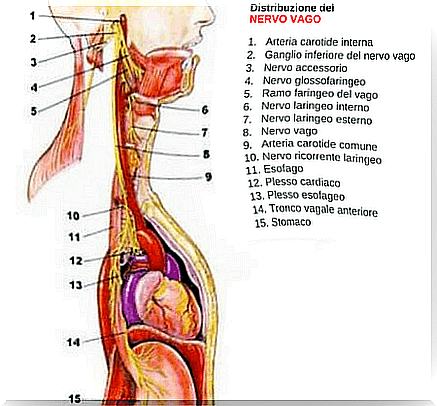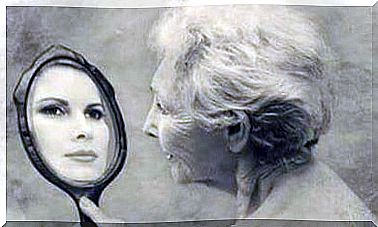Stimulate The Vagus Nerve To Reduce Anxiety And Improve Quality Of Life

The vagus nerve affects a large part of our body, so much so that many define it as a stimulating force, an internal channel that regulates rest and deactivates the body’s anxious responses. Knowing how to stimulate it through exercises such as diaphragmatic breathing, would certainly help us to reduce many of the negative emotions we feel gripped every day.
Let’s stop for a moment to think about all the situations that cause us anxiety, about everything that makes us feel fear, discomfort, repulsion … We visualize these vital moments and notice that in a precise moment we get spasms, stomach cramps, it shakes as if there were hundreds of nervous, angry butterflies inside. This sensation is picked up instantly by the vagus nerve, which sends it to the brain with a message: “there is a threat”.
Professor Wolfgang Langhans of ETH Zurich, together with his team, discovered a few years ago that this fascinating structure of our body is strongly linked to our emotions, specifically the sensation of fear or the need to escape. It has been shown, for example, that people suffering from chronic anxiety also suffer from hypersensitivity to this nerve. Another fact that is important to remember is that the vagus nerve starts from the brain and reaches the digestive and respiratory systems, the heart and the liver.
Consequently, a large part of our body loses its balance when it is a victim of anxiety: the heart accelerates, digestion becomes difficult, we suffer from diarrhea … However,
. Although this structure responds to different parameters configured according to your organism, there is the possibility of stimulating or strengthening it to favor exactly the opposite effect: relaxation.

The vagus nerve: a part of our body that we need to know
In 1921, the Nobel Prize-winning German physiologist Otto Loewi discovered that by stimulating the vagus nerve something really interesting happened : the heart rate was reduced and a very special substance was produced which he called “ Vagusstoff “ (in German “vague substance”). . This “vague substance” was actually a very specific neurotransmitter: it is acetylcholine, the first neurotransmitter to be identified by science.
Acetylcholine is one of the most important chemicals in our body, because it transmits nerve impulses. The vagus nerve for its part plays an equally essential and relevant role: it acts as a stimulating force for the parasympathetic nervous system, becoming responsible for regulating the responses of rest, digestion, the need for escape and relaxation.
It is, so to speak, a kind of play of forces, in which well-being resides in one’s own homeostatic balance.

Clinical psychologists such as Kyle Bourassa of the University of Arizona, explain to us that it would be enough to simply promote a healthy connection of the vagus nerve between the intestine and the brain to regulate more and better the production of neurotransmitters such as acetylcholine and GABA (acid gamma aminobutyric). Thanks to these neurotransmitters, we could reduce heart rate and blood pressure, we could slow down the activity of hyperactive organs due to anxiety (we could sleep better, enjoy better digestion…).
Below, we detail some strategies with which to achieve this goal.
How to stimulate the vagus nerve?
It must be said that it is possible to stimulate the vagus nerve thanks to a good physiotherapist specialized in this area. Through specific massages in the pit of the stomach, it is possible to activate the action of the vagus nerve to experience a pleasant sensation of calm, thus relieving intestinal spasms associated with states of anxiety.
Another strategy to achieve this is diaphragmatic breathing. It is a great daily relaxation tool, and if it is practiced every day, the feelings of threat will decrease, improve digestion, enjoy better inner balance and rest better. In addition, there are many other strategies that together with deep or diaphragmatic breathing can help us:
- Moderate aerobic exercise practiced every day.
- Positive and constructive social connections.
- Practice meditation.
- Keep a personal diary, to encourage dialogue with yourself.
- The consumption of probiotics, as having a healthy and strong intestinal flora has also been found to affect brain health.
- Cold showers of a few seconds.
- Practice yoga.
- Sleeping on the left side.
- Laugh often.
- Increase the levels of serotonin and oxytocin.

In conclusion, as we can see from this last list, there is one aspect on which we must undoubtedly pay our attention:
.
Let’s not forget that it is in the intestine that between 80 and 90% of serotonin, the feel-good hormone, is produced. And we must not underestimate that the simple fact of smiling, dancing, walking, swimming, etc., generates very positive metabolic changes. Changes that this important nerve that “wanders” inside our body picks up instantly and then sends a precise message to our brain: “everything is calm, we’re fine”.









